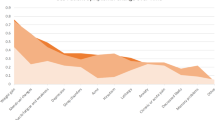Abstract
Despite systemic glucocorticoids are widely used, risk factors for most of their adverse events and patients’ beliefs about the drug are poorly known. An online survey was conducted between February and July 2013 through the website www.cortisone-info.fr. Demographic (e.g., age, gender) and therapeutic (e.g., type of prescribed glucocorticoid, duration of prescription) data were collected. Patients were further asked to answer questions about glucocorticoid-induced adverse events and their beliefs about efficacy and safety of the drug. Risk factors for adverse events and efficacy/safety beliefs were assessed using multivariate logistic regression models. Eight hundred twenty questionnaires were analyzed (women 74.3 %; median age 49 [34–62] years, median equivalent prednisone dosage 20 [10–48] mg/day). The most frequently reported adverse events were insomnia (n = 477, 58.2 %), mood disturbances (n = 411, 50.1 %), hyperphagia (n = 402, 49.0 %), and lipodystrophy (n = 387, 47.2 %). The risk of some adverse events (e.g., weight gain, easy bruising) increased with the duration of exposure while other adverse events (e.g., insomnia, mood disorders, epigastric pain) were present since the first days of exposure. The risk of hirsutism, altered wound healing, mood disturbances, weight gain, lipodystrophy, hyperphagia, and epigastric pain decreased with age. Cutaneous disorders, morphological changes, and epigastric pain were more frequently reported by women. Interestingly, patients prescribed prednisolone reported less adverse events than those prescribed prednisone. No adverse event, demographical or prescribing characteristics were associated with beliefs about efficacy while factors associated with safety concerns were age (OR: 1.2 [1.1–1.3] per 10-year increase), osteoporosis (OR: 3.3 [1.4–7.9]), easy bruising (OR: 1.6 [1.1–2.3]), insomnia (OR: 1.7 [1.2–2.4]), and weight gain (OR: 1.6 [1.1–2.2]). These results may help clinicians to adapt information speech, therapeutic education, and clinical and laboratory monitoring of patients prescribed glucocorticoid therapy.
Similar content being viewed by others
References
Fardet L, Petersen I, Nazareth I (2011) Prevalence of long-term oral glucocorticoid prescriptions in the UK over the past 20 years. Rheumatology (Oxford) 50:1982–1990
Fardet L, Flahault A, Kettaneh A, Tiev KP, Généreau T, Tolédano C, Lebbé C, Cabane J (2007) Corticosteroid-induced clinical adverse events: frequency, risk factors and patient’s opinion. Br J Dermatol 157:142–148
Zerah L, Arena C, Morin AS, Blanchon T, Cabane J, Fardet L (2012) Patients’ beliefs about long-term glucocorticoid therapy and their association to treatment adherence. Rev Med Interne 33:300–304
Arena C, Morin AS, Blanchon T, Hanslik T, Cabane J, Dupuy A, Fardet L (2010) Impact of glucocorticoid-induced adverse events on adherence in patients receiving long-term systemic glucocorticoid therapy. Br J Dermatol 163:832–837
Owens P, Elixhauser A (2007) Adverse drug events in U.S. Hospitals, 2004. Healthcare Cost and Utilization Project (HCUP) Statistical Briefs. http://www.hcup-us.ahrq.gov/reports/statbriefs/sb29.pdf
Sarnes E, Crofford L, Watson M, Dennis G, Kan H, Bass D (2011) Incidence and US costs of corticosteroid-associated adverse events: a systematic literature review. Clin Ther 33:1413–1432
Perdoncini-Roux A, Blanchon T, Hanslik T, Lasserre A, Turbelin C, Dorleans Y, Cabane J, Fardet L (2009) General practitioners’ perception of the impact of corticosteroid-induced adverse events. Rev Epidemiol Sante Publique 57:93–97
Van der Goes MC, Jacobs JWG, Boers M, Andrews T et al (2010) Patient and rheumatologist perspectives on glucocorticoids: an exercise to improve the implementation of the European League Against Rheumatism (EULAR) recommendations on the management of systemic glucocorticoid therapy in rheumatic diseases. Ann Rheum Dis 69:1015–1021
Nassar K, Janani S, Roux C, Rachidi W, Etaouil N, Mkinsi O (2014) Long-term systemic glucocorticoid therapy: patients’ representations, prescribers’ perceptions, and treatment adherence. Joint Bone Spine 81(1):64–68
Poisson J, Six M, Morin C, Fardet L (2013) Glucocorticoid therapy: what is the information sought by patients? Traffic analysis of the website cortisone-info.fr. Rev Med Interne 34:255–257
Curtis JR, Westfall AO, Allison J, Bijlsma JW, Freeman A, George V, Kovac SH, Spettell CM, Saag KG (2006) Population-based assessment of adverse events associated with long-term glucocorticoid use. Arthritis Rheum 55:420–426
Fardet L, Cabane J, Lebbé C, Morel P, Flahault A (2007) Incidence and risk factors for corticosteroid-induced lipodystrophy: a prospective study. J Am Acad Dermatol 57:604–609
Fardet L, Petersen I, Nazareth I (2012) Suicidal behavior and severe neuropsychiatric disorders following glucocorticoid therapy in primary care. Am J Psychiatry 169:491–497
Huscher D, Thiele K, Gromnica-Ihle E, Hein G, Demary W, Dreher R, Zink A, Buttgereit F (2009) Dose-related patterns of glucocorticoid-induced side effects. Ann Rheum Dis 68:1119–1124
Czock D, Keller F, Rasche FM, Häussler U (2005) Pharmacokinetics and pharmacodynamics of systemically administered glucocorticoids. Clin Pharmacokinet 44:61–98
Le Jeunne C (2012) Pharmacology of glucocorticoids. Presse Med 41:370–377
Overman RA, Yeh JY, Deal CL (2013) Prevalence of oral glucocorticoid usage in the United States: a general population perspective. Arthritis Care Res 65:294–298
Iudici M, Russo B, Mitidieri M, Cuomo G, Valentini G (2014) Glucocorticoids in systemic sclerosis: patients’ beliefs and treatment adherence. Scand J Rheumatol 2:1–9
Disclosures
None.
Funding
None
Author information
Authors and Affiliations
Corresponding author
Additional information
The authors have full control of all primary data and agree that the journal can review their data upon request.
Electronic supplementary material
Below is the link to the electronic supplementary material.
ESM 1
(DOCX 16 kb)
Rights and permissions
About this article
Cite this article
Morin, C., Fardet, L. Systemic glucocorticoid therapy: risk factors for reported adverse events and beliefs about the drug. A cross-sectional online survey of 820 patients. Clin Rheumatol 34, 2119–2126 (2015). https://doi.org/10.1007/s10067-015-2953-7
Received:
Revised:
Accepted:
Published:
Issue Date:
DOI: https://doi.org/10.1007/s10067-015-2953-7




